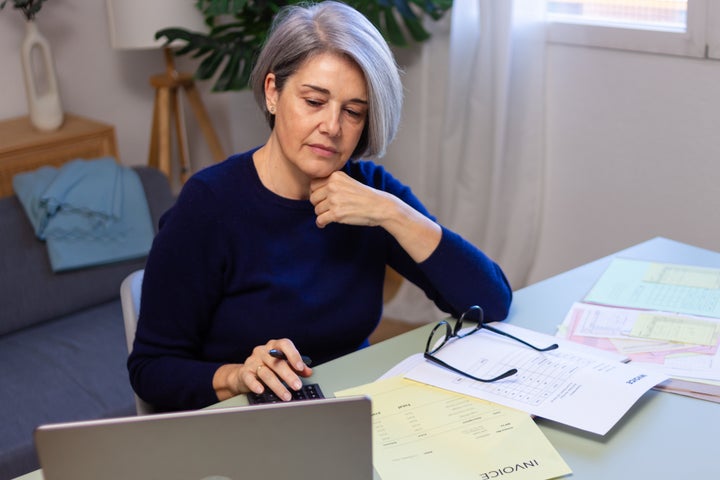We’re Over 50. This Is The 1 Financial Decision That Saved Our Lives.
By the time people hit their 50s, they have seen it all ― marriages and divorces, unexpected health and personal emergencies, the joys of raising children or the deaths of loved ones.
The one guarantee in life is that it will surprise you, and unfortunately, too many older Americans don’t have enough money to weather life’s unexpected challenges. According to research by the AARP Public Policy Institute, half of people over age 50 don’t have any money in their emergency savings.
Advertisement
But it’s never too late to make a radical financial decision that can change your life for the better.
HuffPost asked five people over 50 to reflect on the big smart money decisions they made earlier in their lives. They shared the one big decision that fundamentally changed the trajectory of their lives for the better. Take note and heart in what they shared.
Advertisement

IsiMS via Getty Images
1. Declaring personal bankruptcy
“I had to file for bankruptcy after my divorce in midlife. First of all, the divorce itself was a great decision, as my marriage was not in good shape and neither were our finances. If I had stayed, I would have just dug myself into a deeper hole. The personal bankruptcy was tougher on me emotionally than the divorce. I felt a lot of shame around it. However, given that the amount of debt was so high — I had been living off of credit just to pay bills during the recession while my then-husband and I navigated being unemployed ― there was just no other choice for me. I owed $180,000.
Of course filing for bankruptcy costs money, and it was also hard for me to save the amount to pay the lawyer and then go from there. This offered me a chance to start over. I was a single mom on welfare for over a year, and when I was able to reinvent my career as a writer from print to digital, I never looked back. Not only did I get a second chance at getting things right personally ― I ended up meeting the love of my life ― but also professionally and financially.
When I heard in the courtroom that if you file for bankruptcy once, you are more likely to do it again, I told myself that would not be the case. So far, so good. I even have a HYSA [high yield savings account] with money in it now.
I would only recommend personal bankruptcy as a last resort. I was in that position, and I don’t regret doing it. If I hadn’t filed for bankruptcy, I would probably have had to deal with each debt separately, I would not have known how to navigate that and I would be even more depressed and feeling hopeless than I already was. I was living in Florida during the housing bubble burst in 2008 and ’09. Things were tough here.” — Lorraine Ladish, 61, Sarasota, Florida
Advertisement
2. Quitting my corporate job and getting a union job in the trades
“The financial decision which saved my life was leaving the corporate world [in my early 30s] and joining the union ― International Union of Operating Engineers ― my father was a member of.
Fortunately, I had a father in the union who finally went, ‘Look, go off to the union hall and take some tests and see how you do.’ And I did fine. And I took classes. From there, it was history. With that decision, I made a lot more money and am in a far better mindset to deal with this burning capitalist hellscape we are caught in right now.
My local union actually has a counselor on staff. And I’ll be honest, that saved my life. I was able to actually access therapy through my union’s on-staff counselor, who understood the working-class issues I grew up with, as well as learn to resolve [mental health] problems which were interfering with my ability to hold a job.
Advertisement
I make over six figures. And that’s just base pay. I also have an actual pension. I don’t pay anything out of pocket for my health insurance. I’m in a very good position financially for myself and my family, and [getting a union job and leaving corporate America] was literally a pivot point in my life.” — Caias Ward, 51, New Jersey
3. Clearly defining with my partner what contentment meant for our family
“My big financial decision was when my husband and I developed a clear understanding of contentment, the state of happiness and satisfaction wherever you are.
If we had not done that, then we would not have been able to learn how to live off one income. My husband made the most money, so we lived off of his income, made our budget off of his income, and used my income to save and pay off debt. When my daughters both were in elementary school, I was then able to put a pause on my career and get a job that offered me more flexibility. The flexibility was more important to be able to be home with the girls and do all the mom things. I wanted to be the classroom mom and go to the parent meetings.
Advertisement
And so having that level of contentment meant we were able to live below our means. And so that created the room for us to do other things with our money. We were able to pay off our home early, and because we paid off our home early, we were able to buy a retirement home. So I go back and forth between Michigan and Arizona. That was the best financial choice he and I made.
We never automatically allowed lifestyle creep to come in and stretch us beyond what we consider that level of contentment for us.” — Weslia Echols, 54, Grosse Pointe Woods, Michigan

shapecharge via Getty Images
Advertisement
4. Living off less than one partner’s paycheck
“When I was getting married to my military husband, we had spent 22 months dating and I knew that he was really good at spending all his money prior to meeting me. I was really good about paying down debt and living within my means. So we made a decision, after knowing each other two years, to set and reach for financial goals that would get us ahead in life.
The first year we were married, we moved into my modest house and saved all of his salary, plus some of mine, too. At the end of the first year, we made our first move as a military family. We took the equity in the home I owned and added to it a large sum of money we had saved by living on less than one salary and paid cash for our next home. This allowed us to save the housing allowance received from the military, and we continued to save at least 50% of our incomes for the next 15 years. We paid cash for houses, paid cash for vehicles, and it really allowed us the ability to save a lot.
When my husband retired from the Air Force, we owned a home with 10 acres, a lake house and the forestry land. He passed away shortly after that ― he was 53 and I was 48 ― and because of our planning, I was able to retire early.
Advertisement
I am on a cruise in the Mexican Riviera right now. If I hadn’t had the mindset to pay off debt ― student loan, cars and homes ― and to save for our future, I would be in a very different situation right now. I would have a house full of things I don’t need. I feel I would have not had the opportunity to travel the world because I spent money elsewhere.” — Andi Wrenn, 58, Raleigh, North Carolina
5. Setting our children up for financial independence success
“If I had to choose just one financial decision, it would be that we maintained most of our very frugal ways as our incomes and net cash flow dramatically increased after we raised two children to adulthood around 2018.
We made sure our children understood we expected them to be financially independent once they graduated from college. We slowly turned off the financial tap while they were in college, as we were working to set them up for success. We were open about the plan, and there were no surprises. So many individuals and couples neglect their needs as empty nesters to care for their children through rent, student loan payments, cars or car payments, paying for pet care.
Advertisement
We were not able to save for their college expenses during the lean years, but we made a deal with them for a budgeted amount each year to help with tuition, housing and some spending money. We expected our daughter to take out student loans in her name up to the federal limit ― with no promise we would be in a position to help pay them off. But if we were when she graduated, we would. And we were able to pay them off by saving up those four years.
We Don’t Work For Billionaires. We Work For You.
Already contributed? Log in to hide these messages.
After graduation, our son asked to remain in our home while he searched for a professional firefighter position in a larger city. He sat down with us, we talked about his goals and ours. We agreed to a monthly rent amount that was reasonable to cover his portion of utilities, food, the indoor parking spot ― but he also acted as a dog sitter on vacations. Plus, we outlined the ongoing ideas we established two years ago about being a good roommate regarding cleaning his space, kitchen duty, helping with the yard and snow removal. Everything worked great for two-and-a-half years until he got his position. We missed his help!” — Cherie Stueve, 58, San Francisco Bay area
Some answers were lightly edited for clarity and length.

Comments are closed.